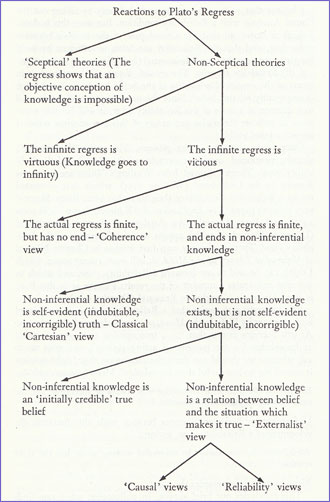David Malet Armstrong - Wikipedia
David Malet Armstrong (born 8 July 1926), often D. M. Armstrong, is an Australian philosopher. He is well known for his work on metaphysics and the philosophy of mind, and for his defence of a factualist ontology, a functionalist theory of the mind, an externalist epistemology, and a necessitarian conception of the laws of nature.[1] He was elected a Foreign Honorary Member of the American Academy of Arts and Sciences in 2008.[2]
Contents |
Philosophy
Armstrong's philosophy is broadly naturalistic.Epistemology
Armstrong's view of knowledge is that the conditions of knowledge are satisfied when you have a justified true belief that you arrived at through a reliable process: that is, the belief was caused by some factor in the external world (hence the label of externalism). Armstrong uses the analogy of a thermometer: as a thermometer changes to reflect the temperature of the environment it is in, so must one's beliefs if they are reliably formed. The connection between knowledge and the external world, for Armstrong, is a nomological relationship (that is, a law of nature relationship).[3] Here, Armstrong's view is broadly similar to that of Alvin Goldman and Robert Nozick.[4] The intuitions that lead to this kind of externalism led Alvin Plantinga towards an account of knowledge that added the requirement for 'properly-functioning' cognitive systems operating according to a design plan.[5]Metaphysics
In metaphysics, Armstrong defends the view that universals exist (although Platonic uninstantiated universals do not exist). Those universals match up with the fundamental particles that science tells us about.[6] Armstrong declares himself to be a scientific realist.[7]Armstrong's philosophical development has been heavily influenced by John Anderson.
Bibliography
Books
- Berkeley's Theory of Vision: A Critical Examination of Bishop Berkeley's Essay towards a New Theory of Vision. Melbourne: Melbourne University Press, 1960.
- Bodily Sensations. London: Routledge & K. Paul, 1962.
- Perception and the Physical World. London: Routledge & K. Paul, 1961. [ISBN 0-7100-3603-5]
- A Materialist Theory of the Mind. London: Routledge & K. Paul, 1968. [ISBN 0-415-10031-3]
- Belief, Truth and Knowledge. London: Cambridge University Press, 1973, [ISBN 0-521-08706-6]
- Universals and Scientific Realism. Cambridge: Cambridge University Press, 1978. [ISBN 0-521-21741-5]
- The Nature of Mind and Other Essays. Cornell University Press (1981). [ISBN 0801413532 ]
- What is a Law of Nature? Cambridge: Cambridge University Press, 1983. [ISBN 0-521-25343-8]
- A Combinatorial Theory of Possibility. Cambridge: Cambridge University Press, 1989. [ISBN 0-521-37427-8]
- Universals: An Opinionated Introduction. Boulder, CO: Westview Press, 1989. [ISBN 0-8133-0772-4]
- A World of States of Affairs. Cambridge: Cambridge University Press, 1997. [ISBN 0-521-58064-1]
- The Mind-Body Problem: An Opinionated Introduction. Boulder, CO: Westview Press, 1999. [ISBN 0-8133-9056-7]
- Truth and Truthmakers. Cambridge University Press, 2004. [ISBN 0-521-83832-0]
- Sketch for a Systematic Metaphysics. Oxford University Press, 2010. [ISBN 0199590613]
Selected Articles
- "Is Introspective Knowledge Incorrigible?" Philosophical Review 72 (1963), 417-32.
- "Meaning and Communication". Philosophical Review 80 (1971), 427-47.
- "Alan Ker Stout, 1900-1983", Proceedings of the Australian Academy of the Humanities 12 (1982–83): 106–109, retrieved 2009-02-18.
- (with Peter Forrest) "An Argument against David Lewis' Theory of Possible Worlds". Australasian Journal of Philosophy 62 (1984), 164-8.
- "Classes are States of Affairs". Mind 100 (1991), 189-200.
- Black Swans: The formative influences in Australian philosophy, in Rationality and Irrationality, (Proceedings of the 23rd International Wittgenstein Symposium, Kirchberg am Wechsel, Austria, 2000) ed. B. Brogaard & B. Smith, Wien.
Miscellaneous
- "Interview". In Lee Jobling and Catherine Runcie (eds.), Matters of the Mind: Poems, Essays and Interviews in Honour of Leonie Kramer. Sydney: University of Sydney, 2001, 322-332.
See also
Further reading
- R.J. Bogdan (ed.), D.M. Armstrong Dordrecht: Reidel, 1984. [ISBN 90-277-1657-9]
- John Bacon, Keith Campbell & Lloyd Reinhardt (eds.), Ontology, Causality, and Mind: Essays in Honour of D.M. Armstrong. Cambridge: Cambridge University Press, 1993. [ISBN 0-521-41562-4][8]
- J. Franklin, Corrupting the Youth: A History of Philosophy in Australia (Macleay Press, 2003), chs 9, 11, 12,
- S. Mumford, David Armstrong. Acumen, 2007. [ISBN 1844651002]
References
- ^ Biographical Dictionary of Twentieth-Century Philosophers, London: Routledge, 1996, pp. 31–32, ISBN 0-415-06043-5
- ^ "Book of Members, 1780-2010: Chapter A". American Academy of Arts and Sciences. Retrieved 25 April 2011.
- ^ Lehrer, Keith. (2000), Theory of knowledge, Boulder, Colorado: Westview Press, p. 178, ISBN 0-8133-9053-2, 0813390532
- ^ John L. Pollock (1999), Contemporary theories of knowledge, Lanham, Md: Rowman & Littlefield Publishers, pp. 13, ISBN 0-8476-8936-0, 0847689360
- ^ Alvin Plantinga (1993), Warrant and proper function, New York: Oxford University Press, ISBN 0-19-507863-2, 0195078632
- ^ D. M. Armstrong (1989), Universals, Boulder: Westview Press, ISBN 0-8133-0763-5, 0813307635
- ^ D. M. Armstrong (November 28, 1980), A Theory of Universals, Cambridge University Press, ISBN 978-0-521-28032-7, 052128032X
- ^ Cambridge Catalogue -- Ontology, Causality, and Mind
 Following some unpublished work of Gregory O'Hair, Armstrong identifies and diagrams several possible ways to escape Plato's regress, including:
Following some unpublished work of Gregory O'Hair, Armstrong identifies and diagrams several possible ways to escape Plato's regress, including: 





